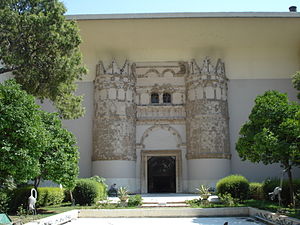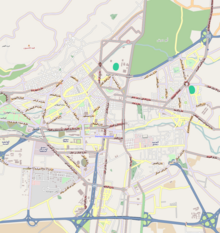National Museum of Damascus

The façade, which was the gateway to Qasr al-Heer al-Gharbi
|
|
| Established | 1979 |
|---|---|
| Location | Damascus, Syria |
| Coordinates | 33°30′45″N 36°17′24″E / 33.512572°N 36.290044°E |
The National Museum of Damascus (Arabic: المتحف الوطني بدمشق) is a large museum in the heart of Damascus, Syria. The most popular part of the museum is the 2nd century AD Dura-Europos synagogue.
The National Museum of Damascus lies in the West of the City, between the Damascus University and the Tekkiye Mosque Complex.
The museum was founded in 1919 at Madrasseh al Adiliyeh. The current building was constructed in 1936, with wings being added in 1956 and 1975.
The exhibits are organised into 5 wings;
Remains and skeletons from different Stone-Age periods.
Many Exhibits from ancient sites such as Ebla. The most important of these is the world's first Alphabet.
This wing contains Roman, Greek and Byzantine exhibits. It includes many rare statues, as well as stone and marble sarcophagi. It also includes a jewelry section, and many other exhibits which may not be found in any other part of the world.
The facade of an Islamic palace has been moved and reconstructed as the museum's main entrance. Some of the contents of the palace are also located in the museum, including carvings.
It also contains many exhibits made of glass and metal, as well as coins, from different periods of Islamic History. There are also scriptures from the Umayyad era to the Ottomans.
There is also a hall containing an example of a traditional Syrian home, which was obtained from an old house which goes back to the 18th century.
There is a library adjacent to this section.
Contains contemporary works of artists from Syria, the Arab world, and other countries.
Entrance of the museum
Damascus museum couple in stone
Lion
Basalt statue of the goddess Al-lāt-Minerva from As-Suwayda
...
Wikipedia


